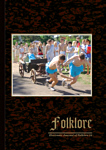Motivational Underpinnings of Estonian Folk Dance Practices among the Estonian Diaspora over Time
Motivational Underpinnings of Estonian Folk Dance Practices among the Estonian Diaspora over Time
Author(s): Angela Arraste, Iivi Zájedová, Eha RüütelSubject(s): Customs / Folklore
Published by: Eesti Kirjandusmuuseum
Keywords: folk dance; Estonian diaspora; leisure activities; self-determination; motivation; cultural transmission
Summary/Abstract: This article is a part of a wider research on Estonian folk dance, aiming to map the emergence of folk dance groups and to study the practices and role of folk dance among the Estonian diaspora. The article sets out to explore incentives contributing to intergenerational transmission of Estonian folk dance tradition. 54 interviews (21 men and 33 women aged 38 to 87) were carried out with Estonians living in Australia, Canada, Germany, Great Britain, Sweden and the United States. The analysis of the interviews is based on two research questions: 1) What incentives have guided Estonians’ folk dance activity in historical perspective from World War II until today? 2) What qualities originating in Estonian folk dance have motivated people to carry on Estonian folk dance practices? The principles of grounded theory were used in the analysis of interviews. The article discusses the results of two sets of analyses. Motivational changes in folk dance as a leisure pursuit have brought into focus three historical periods of folk dance transmission. Incentives originating from dance and dancing (self-expression, self-determination, cooperation, emotion, physical training) and the external qualities accompanying dance and dancing (socialising, ‘Estonianness’, tradition) are discussed in the context of continuity of Estonian folk dance tradition among the Estonian diaspora.
Journal: Folklore: Electronic Journal of Folklore
- Issue Year: 2013
- Issue No: 54
- Page Range: 97-118
- Page Count: 22
- Language: English

